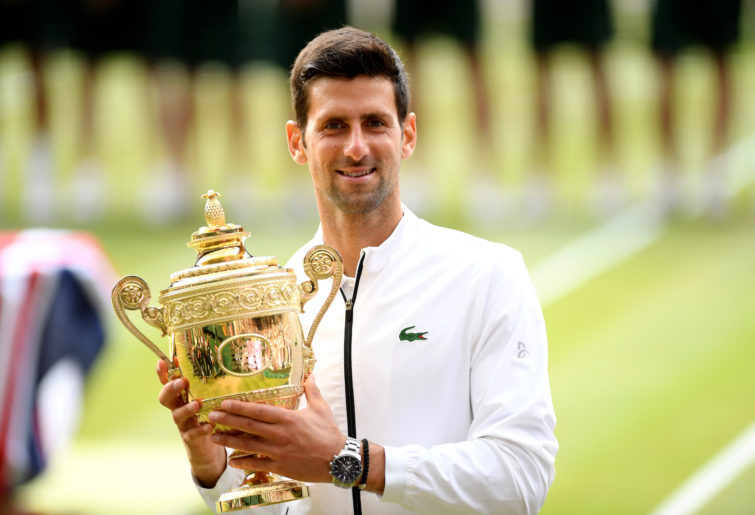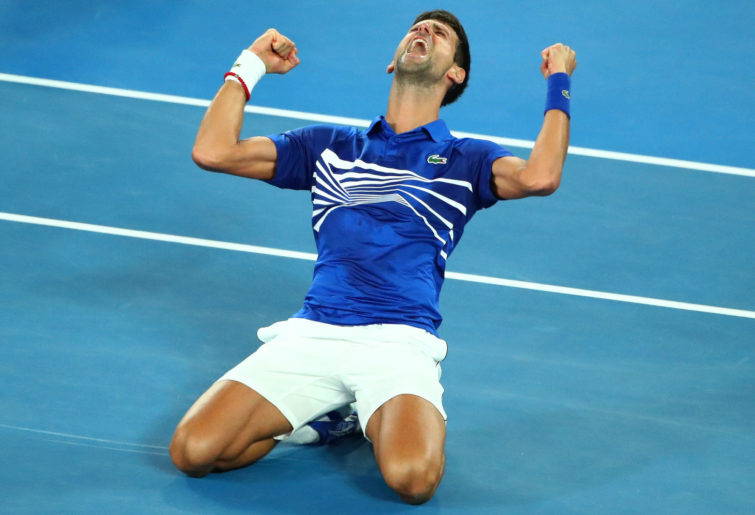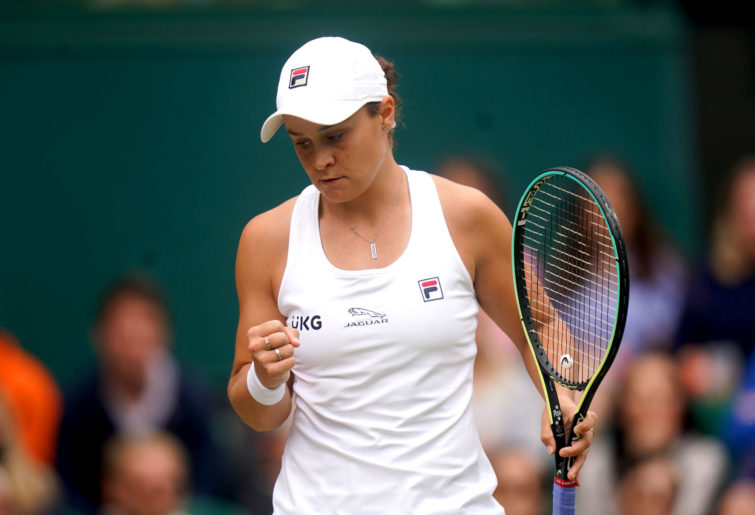Demon slays the King: de Minaur savours 'once in a lifetime' moment after knocking off Nadal on clay
Rafael Nadal has hailed the brilliance of Alex de Minaur, calling him "a great player" after the Australian forced the Spanish legend to say…
Opinion
After the cancellation of last year’s Wimbledon Championships, the tournament made a successful comeback this year, with Novak Djokovic and Ashleigh Barty both leaving the All England Club after creating history with their respective victories.
In the men’s draw, Djokovic created history in more ways than one, winning his sixth Wimbledon title by coming from a set down to defeat first-time major finalist Matteo Berrettini in four sets.
The Djoker, contesting his 30th major final, started the match as a hot favourite to land his 20th major title and all his experience appeared to show when he rocketed to a 5-2 lead in the opening set.
But Berrettini, the first Italian man to reach the final at SW19, would not give in, fighting back by saving a couple of set points to force a tiebreak which he then dominated to go one set up.
It would only fire Djokovic into action, and before anyone could blink he secured a double break to take a 4-0 lead in the second set; while Berrettini would peg back a break, it proved enough for the Djoker to take the second 6-4.
An early break in the third saw the Serb claim the third 6-4, though the Italian had the crowd on his side when he hit a tweener to force an error from Djokovic while he also held a few break points in the set as well.
The 25-year-old had the chance to go three break points up in the fourth game, but a poorly-played drop shot proved to be the turning point as the Djoker broke twice more to claim the fourth set, and hence the championship for a sixth time.

(Photo by Matthias Hangst/Getty Images)
With his win over Matteo Berrettini in the final, Novak Djokovic:
* became the first man since Rod Laver in 1969 to win the first three majors of a year;
* became the first man since Rafael Nadal in 2010 to win majors on three different surfaces in the same year;
* became the first man since Nadal eleven years ago to complete the Channel Slam (i.e. winning the French Open and Wimbledon in the same year);
* joined his contemporaries Nadal and Roger Federer on a joint-record 20 major men’s singles title; and
* kept alive his chances of completing a rare Golden Calendar Slam, which no man has ever achieved.
After the win, Djokovic warned the rest of men’s tennis that he, Nadal and Federer have no intention of stopping on 20 Major titles, and that they’ll be out to continue winning Major titles and breaking more records at the expense of the so-called “Next Gen”.
“It means none of us three will stop,” he said.
“I have to pay great tribute to Rafa and Roger. They are legends of our sport and they are the two most important players that I ever faced in my career. They are the reason that I’m where I am today.
“They’ve helped me realise what I need to do in order to improve and get stronger mentally, physically, tactically.
“The last 10 years have been an incredible journey. It’s not stopping here.”
Indeed, Djokovic has proven to be the most mentally toughest of the three, as evidenced when he came from two sets to love down to defeat Stefanos Tsitsipas in the final of the French Open last month – something not even Nadal or Federer could do in their Major finals.

Novak Djokovic (Photo by Scott Barbour/Getty Images)
En route to that title he became the first man to beat Nadal at Roland Garros multiple times, after his quarter-final win in 2015.
It has created a major subplot ahead of the US Open, which begins at the end of next month, whereby any one of the so-called “Big Three” will shoot for a record-breaking 21st Major men’s singles title.
The stakes will be highest in Djokovic’s case, especially if he wins the Olympics singles Gold Medal in Tokyo, as he will have the chance to become the first man to achieve a Calendar Golden Slam – something only achieved by Steffi Graf in 1988.
Doing so would also see him emulate his own feat of winning four consecutive Majors, which he did between Wimbledon in 2015 and the 2016 French Open, the latter seeing him complete his set of Grand Slam titles.
On the flipside, it will be interesting to see how Dominic Thiem fares in what will be his first Major tournament as the defending champion.
Last year, the Austrian cashed in on the absences of Federer and Nadal, and the disqualification of Djokovic on the eve of the quarter-finals, to become the first man born in the 1990s to win a Major title.
Since then, three other men born in this decade – namely Daniil Medvedev, Stefanos Tsitsipas and Matteo Berrettini – have reached a Major final, only to be on the wrong end of a masterclass from Novak Djokovic.
Djokovic’s win in the Wimbledon final goes to show that the “Next Gen” are not only still a long way off any Grand Slam glory, but also from seriously challenging the elder statesmen of the game at the highest level.
Men’s championship result
[1] Novak Djokovic (SRB) defeated [7] Matteo Berrettini (ITA) 6-7 (4-7), 6-4, 6-4, 6-3.
In the women’s field, a childhood dream was finally realised as Ashleigh Barty defeated Karolina Pliskova in three sets in what can only be described as one of the great women’s finals ever seen at Wimbledon.
There were doubts as to whether the Queenslander would take her place at the All England Club, after she’d suffered a hip injury which forced her to retire in her second round match at the French Open last month.
However, she was able to make the trip to London, where her previous best result was reaching the fourth round in 2019 where she lost to Alison Riske after she had won the first set.
After a first-round scare against Carla Suarez Navarro, Barty stormed her way through the draw, defeating the likes of reigning French Open champion Barbora Krejcikova and seasoned veteran Angelique Kerber en route to reaching her second Major final.
Standing in her way was serving machine Karolina Pliskova, who was eager as ever to break her duck in her first Major final in nearly five years.
Fears of a one-sided final surfaced after Barty won the first 14 points of the match on the way to taking the first set 6-3, before she broke for a 3-1 lead early in the second and was seemingly in cruise control.
But Pliskova would not go away, breaking back immediately to put the set back on serve, and then edging ahead as she looked to push the match to a deciding set.
Barty would break in the eleventh game to put herself in the position to serve for the title, but there was more drama to come as the 29-year-old Czech right-hander broke right back to force a tiebreak, which she would win after a Barty double-fault.

Ashleigh Barty celebrates. (Photo by Adam Davy/PA Images via Getty Images)
Many thought Pliskova would enter the final set with all the momentum, but a Barty break of serve in the second game would ultimately prove to be the difference as she held it all the way to the death.
After Barty shanked a forehand at 30-all in the ninth game, Pliskova brought up a break point, but the Australian would claim the final three points of the match, sealing victory when Pliskova put a backhand into the net.
In winning she became the first Australian woman since Evonne Goolagong Cawley in 1980 to win tennis’ holy grail, and the first of either gender to do so since Lleyton Hewitt won the second of his two Major titles in 2002.
The 25-year-old also became the first top seed to triumph at Wimbledon since Serena Williams did so in 2016, as well as the first world number one to win any Major since Simona Halep won the 2018 French Open.
Further, she also became the fourth woman to complete the junior-senior Wimbledon double, after Ann Jones, Martina Hingis and Amelie Mauresmo.
As soon as Barty realised her childhood dream, back home in Australia, the millions who watched on television in the early hours of Sunday morning burst into celebrations after seeing their top-ranked tennis player triumph on the grandest stage of all.
So much so, her Wimbledon triumph was acknowledged at quarter-time of the Richmond vs Collingwood AFL match last Sunday.
Ash Barty getting a big round of applause after being acknowledged on the big screen at quarter-time ???? #AFLTigersPies
— Sarah Black (@_sjblack) July 11, 2021
Many of you will also remember that, during her playing hiatus, it was her who presented Trent Cotchin the AFL premiership cup after the Tigers won last year’s AFL grand final at the Gabba.
Ash Barty presents the premiership cup to the Richmond Tigers. ????????????
What a season. pic.twitter.com/Fh1c3U6XZU
— 7AFL (@7AFL) October 24, 2020
In winning Wimbledon, she may have also answered the critics who questioned her status as world number one, which she held right through all of last year despite not playing a tournament after February, just before the World Health Organisation declared the ongoing COVID-19 pandemic as such.
It is the Ipswich native’s second Major title, after winning the French Open in 2019. Rather than travel home, where she would’ve been subject to a fortnight’s quarantine, she will now turn her focus to the Olympics before she attacks the US Open, the only Major where she’s yet to reach the quarter-finals.
Tennis fans will also be hoping for the quick return to competition of Naomi Osaka, who withdrew from both the French Open and Wimbledon to focus on her mental health; perhaps the lure of winning a third US Open title will entice her to return by then.
The year’s final Major also shapes as, possibly, the final chance for the ageless Serena Williams to equal Margaret Court’s long-standing record of 24 Major singles titles, before the American turns 40 in September.
Therefore, Barty will face some tough competition in New York as she fights tooth and nail to defend the world number one ranking which she has held since 2019.
Women’s championship result
[1] Ashleigh Barty (AUS) defeated [8] Karolina Pliskova 6-3, 6-7 (4-7), 6-3.
To finish off, congratulations to Novak Djokovic and Ashleigh Barty, who both leave the All England Club as thoroughly deserved champions, in particular the Australian, whose next major goal will be to win the Australian Open early next year.